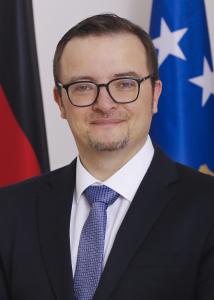The regional school commenced with an official opening, where the participants were greeted by Daniel Braun, Konrad Adenauer Foundation and Sandra Pasaric, Wilfried Martens Centre for European Studies. The organizers expressed their gratitude for the participants' presence and highlighted the importance of cross-cultural exchange and cooperation in promoting regional understanding and unity.
On the first day, Ivanka Vasilevska, MP in the Assembly of Republic of North Macedonia, delivered a comprehensive presentation on the topic "The Role of Parliamentarians in Protecting Freedoms and Civil Rights". This lecture provided valuable insights into the legislative processes and the vital role parliamentarians play in safeguarding individual liberties and civil rights within democratic societies. The participants actively engaged in the discussion, sharing their perspectives and experiences from their respective countries. In the frames of the discussion, the participants talked about Artificial Intelligence and human rights, on which topic Nikola Grabar, participant from Croatia, prepared a short text (attached) about the challenges and risks that should be taken into account in the use of Artificial Intelligence.
Following the lecture, the program continued with a series of workshops facilitated by Ivan Jovanov from the Youth Association LEAD, Skopje. Over the next two days, the participants had the chance to engage into four distinct workshop topics, allowing for deeper exploration and practical applications of the concepts discussed.
The workshop entitled Youth in Diverse Societies: Exploring Identity and Ethnicity aimed to foster a better understanding of individual and collective identities in diverse societies. The participants engaged in constructive discussions, shared personal experiences, and explored the challenges and opportunities arising from ethnic diversity.
After that followed Skopje Cultural Tour: Getting Acquainted with Multicultural and Multi-Religious Life in Skopje. The participants embarked on a cultural tour of Skopje, the capital city of North Macedonia. This immersive experience enabled them to witness firsthand the multicultural and multi-religious life of the city. Visiting significant cultural and religious sites, they gained a deeper appreciation for the diversity and historical heritage of Skopje.
The next day started with the workshop entitled Facilitating Inter-Community Dialogue and Exchange for Greater Youth Inclusiveness, which aimed to equip the participants with the necessary skills and tools to facilitate meaningful inter-community dialogues. Through interactive exercises and role-plays, they developed effective communication strategies to bridge cultural divides and promote inclusiveness within their societies.
The final workshop Youth in Action: Promoting a Culture of Peace and Non-Violence focused on empowering the participants to take an active role in promoting peace and non-violence within their communities. They explored various methods of youth activism and discussed practical ways to initiate positive change in areas affected by conflict or tension.
Throughout the two days of the extensive program, the participants actively participated in group discussions, shared their unique perspectives, and demonstrated a high level of engagement. They collaborated in group activities, exchanged ideas, and showcased their creativity in proposing innovative solutions to social challenges.
The workshops provided a supportive environment for the participants to learn from one another, challenge preconceived notions, and broaden their horizons. They actively embraced the opportunity to connect with peers from different countries, fostering lasting friendships and cultivating a sense of regional unity.
The regional school in Skopje, North Macedonia, served as a platform for cross-cultural exchange, dialogue, and personal growth for the 20 young participants from various countries in the region. Through lectures, workshops, and cultural experiences, they explored important topics such as freedom, civil rights, identity, ethnicity, nationalism as well as youth inclusiveness inter-community dialogue and building a coherent society of mutual understanding and cooperation between people of different ethnic and religious background.




